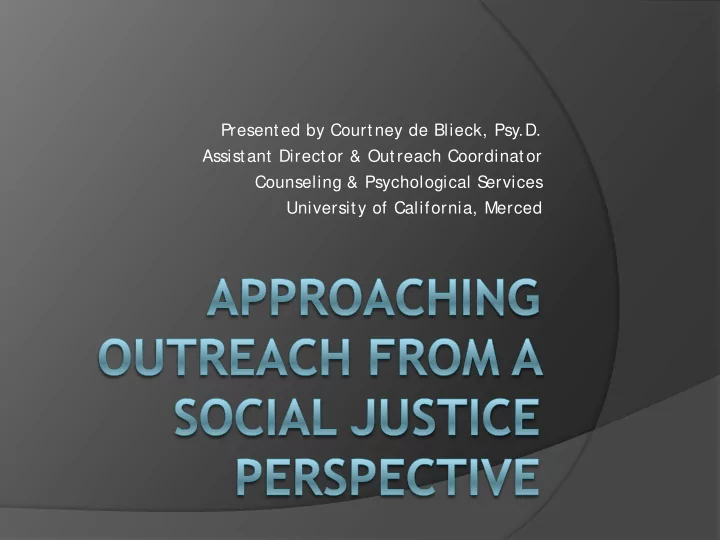

Presented by Courtney de Blieck, Psy.D. Assistant Director & Outreach Coordinator Counseling & Psychological S ervices University of California, Merced
Goals of Presentation Understand why it is necessary to apply a social j ustice framework to outreach on college campuses Determine how to apply a social j ustice framework to a college outreach program Determine how to apply a social j ustice framework to individual outreach workshops
What is social j ustice? Definition: Full and equal participation of all groups of a society that is mutually shaped to meet their needs and provides physical and psychological safety to all members (Adams, Bell & Griffin, 1997)
What does social j ustice in outreach involve? Understanding the social influences (systems) that contribute to mental health concerns Communicat ing that you understand these systems and how they affect students both individually and as a group Taking the approach of working to change the system from the inside-out in order to promote mental health
. Why is it important to apply a social j ustice framework to an outreach program?
Answer… Discriminat ion and disparities in access to resources are maj or contributors to mental illness S tudents bring their histories of discrimination and disparit ies with them to campus Discriminat ion and disparities exist on college campuses
And… Addressing discriminat ion and disparities allows students to see that you understand where they are coming from Addressing discriminat ion and disparities allows you to have a positive impact on student mental health
Traditional Outreach on College Campuses Based on remedial medical model Implies problem is with the individual student Ignores dysfunctional systems Leads to status quo Perpetuates social inj ustice
S ocial Justice Outreach on College Campuses Focuses on dysfunctional systems Encourages awareness/ change of dysfunctional systems Leads to social change Has impact on wider range of students (i.e., improved mental health)
. How do you apply social j ustice to an outreach program?
Know your student demographics! Allows you to understand the concerns that students might be experiencing Allows you to tailor outreach approach and workshops to these concerns
UC Merced Demographics, 2011-2012 Academic Y ear Major Ethnicity S S HA Latino/ a Asian 5 6 1 Natural 13 American 6 S ciences European 35 36 American Engineering 22 17 African 30 American 29 Undeclared Multi- Ethnic Native Graduate American
UC Merced Demographics, 2011-2012 Academic Y ear 51% Male, 49% Female 60% First Generation College S tudents Maj ority Low S ES Background
Based on this information… What might be some concerns of UC Merced students?
Concerns of UC Merced S tudents S tress related to first-generation status Trauma related to history of discrimination, poverty, and lack of resources High level of intellectualization High degree of somatizat ion of emotional symptoms
Know your campus culture Allows you to determine what inequalities/ disparit ies exist on your campus, as well as how these impact student mental health Allows you to avoid making assumptions about what students need Helps you plan/ be intentional around outreach development
Culture of UC Merced High stigma regarding mental health concerns + Low understanding of importance of self- care + Concern regarding privacy = Difficulty accessing services
How do you get to know your campus culture? Knowing the presenting concerns at the counseling center is a good start, but it is not enough!
Also… Participate in campus activities outside the counseling center Understand community concerns Engage in continuing education around the issues that are prevalent on your campus Collaborate with other departments
S ocioecological Model Framework for understanding the multiple effects and interrelatedness of factors that contribute to a variety of issues (Hawley, 1950; Bronfenbrenner, 1979)
S ocioecological Model Intrapersonal: Individual factors Interpersonal: Influence of significant others Institutional: Rules, norms, and expectations of the university Communal: S etting in which university exists Global: S ocial/ cultural norms, social policy, laws, government policy, etc.
S leep: A S ocioecological Perspective Intrapersonal Interpersonal Genetics Roommates Physical/ mental Friends health Work S ubstance use Family Procrastination responsibilities Late-night activities
S leep: A S ocioecological Perspective Institutional Communal Dorm over- Noise crowding Air quality Late-night classes Heat Instructor S afety expectations S tudent beliefs/ norms Transportation
S leep: A S ocioecological Perspective . Global S ocial/ cultural norms S ocial policy Laws Government policy
. How do you apply a social j ustice framework to individual outreach workshops?
A S ocioecological Approach to S leep Management Intrapersonal Interpersonal Establish good Manage conflicts sleep hygiene with roommates Engage in Discuss time/ stress importance of management good sleep habits with family and Exercise friends Maintain healthy Manage work diet stress
A S ocioecological Approach to S leep Management Institutional Communal Challenge Petition to have university norms noise ordinances in place/ enforced Petition for Establish adequate class time/ space neighborhood watch programs Petition against Discuss overcrowding importance of good air quality
A S ocioecological Approach to S leep Management . Global Work to end social inequality
Contact Information Courtney de Blieck, Psy.D. Assistant Director & Outreach Coordinator Counseling & Psychological S ervices University of California, Merced (209) 228-4551 cdeblieck@ ucmerced.edu
Recommend
More recommend